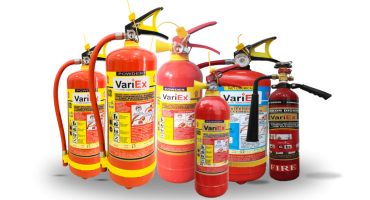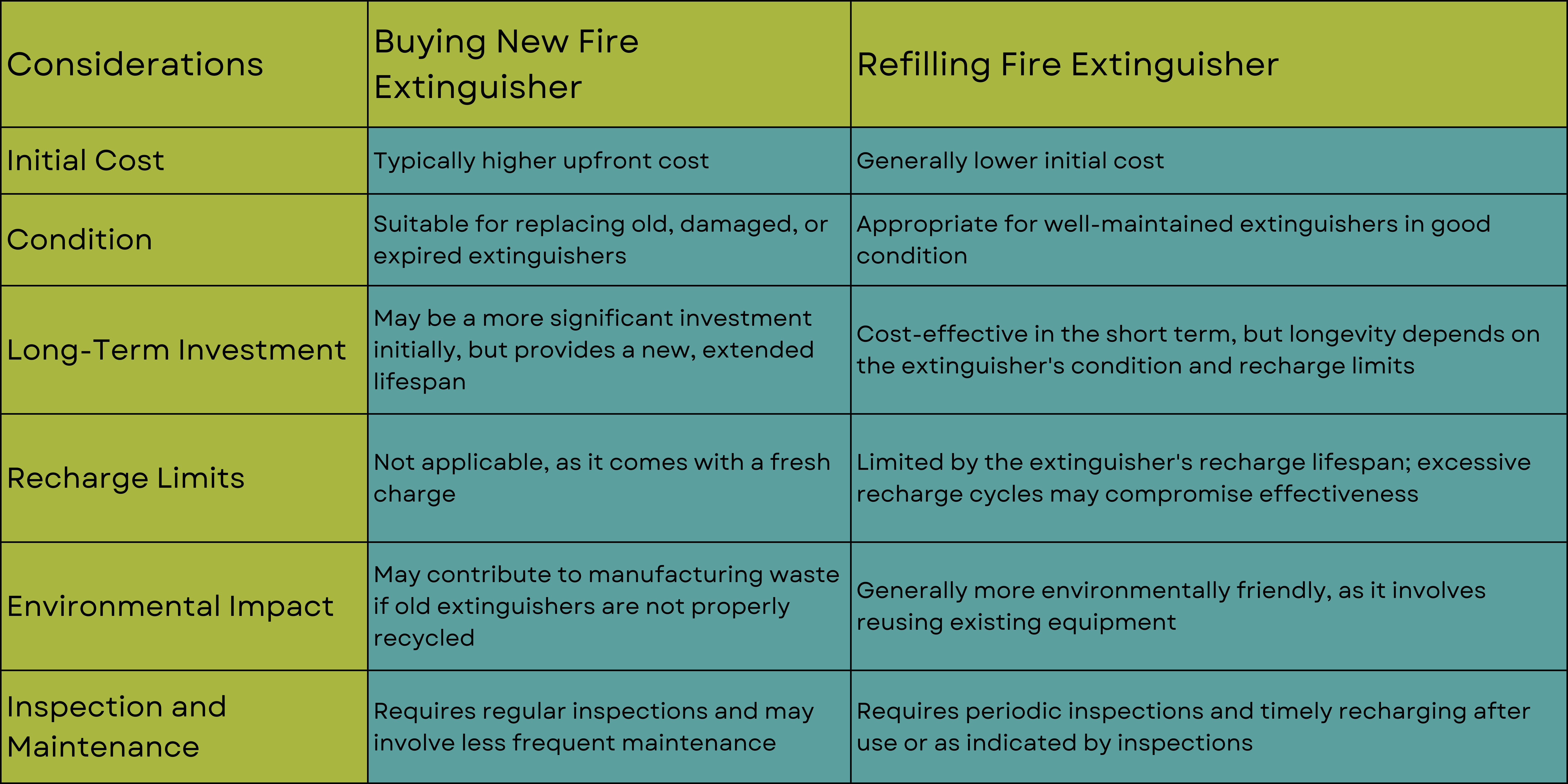![]()
Fire Immuniser
+91-7829629111
Email: info@variex.in
Varistor Technologies Pvt. Ltd.
Block-1, First Floor, Ardente Office One, Hoodi Circle, ITPL Main Road, Bengaluru, Karnataka 560048, IN
Is it cheaper to recharge a fire extinguisher or buy a new one?
The decision to recharge a fire extinguisher or purchase a new one hinges on a critical balance between cost-effectiveness and maintaining reliable emergency preparedness. The question arises: "Is it cheaper to recharge a fire extinguisher or buy a new one?" This inquiry delves into the financial considerations and practicalities associated with these choices. As we explore the factors influencing this decision-making process, we'll weigh the costs, benefits, and crucial factors that contribute to ensuring the efficacy of fire extinguishers in safeguarding lives and property.
Costs and Considerations: Recharging Your Fire Extinguisher
When it comes to fire safety, a properly functioning fire extinguisher is indispensable. Understanding the costs and considerations associated with recharging a fire extinguisher is vital for ensuring its reliability. In this discussion, we'll delve into the recharge process, compare the economics of recharging versus buying new, and explore the frequency and limits of recharging.
Recharge Process Overview: The recharge process is a meticulous procedure that involves assessing, refilling, and pressurizing the fire extinguisher to restore its functionality. Trained professionals disassemble the unit, inspect internal components, refill the extinguishing agent, pressurize it, and conduct final testing to ensure its effectiveness. This process is essential for maintaining the extinguisher's ability to respond swiftly in case of a fire emergency.
Economic Comparison with Buying New: When faced with a depleted fire extinguisher, the decision between recharging and buying a new one often comes down to economics. Recharging is generally a cost-effective option, especially if the extinguisher is in good condition and hasn't reached its maximum recharge limit. However, factors like extensive damage, age, or exceeding the recharge limit might make purchasing a new extinguisher a more prudent investment in the long run.
Frequency and Limits of Recharging: While fire extinguishers are designed to be rechargeable, there are limits to how many times they can undergo this process. Excessive wear and tear, corrosion, or damage to critical components can reduce the number of viable recharge cycles. Regular inspections and adherence to manufacturer recommendations are crucial in determining when a fire extinguisher has reached its recharge limit.
Considerations for Cost-Effective Fire Safety:
Regular Maintenance: Periodic inspections by trained professionals can catch issues early, prolonging the life of your fire extinguisher and reducing the frequency of recharges.
Timely Recharging: Addressing recharge needs promptly after use or when indicated by inspections ensures that the extinguisher is always ready for action.
Up-to-Date Equipment: Consider investing in the latest fire extinguisher models that may have longer recharge lifespans and improved features for enhanced fire safety.
Costs and Considerations
Factors Influencing the Decision
When it comes to fire safety, decisions regarding whether to recharge or replace a fire extinguisher are influenced by several key factors. Each consideration plays a pivotal role in determining the most effective and economical course of action. In this exploration, we'll delve into three primary factors that significantly influence the decision-making process: the type of extinguisher, regulatory compliance, and inspection and maintenance costs.
Type of Extinguisher: The first and foremost factor to consider is the type of fire extinguisher in use. Different extinguishers are designed to combat specific types of fires, such as those involving ordinary combustibles, flammable liquids, or electrical equipment. Before deciding on recharging or replacement, it's essential to assess whether the existing extinguisher aligns with the potential fire risks in your environment. If the extinguisher's design is suitable for your needs and the agent inside is still effective, recharging may be a viable and cost-effective choice.
Regulatory Compliance: Adhering to regulatory standards is a non-negotiable aspect of fire safety. Local regulations may dictate the conditions under which a fire extinguisher can be recharged. Compliance considerations include the age of the extinguisher, the type of extinguishing agent used, and its overall condition. Professional advice and understanding local safety standards are crucial in ensuring that any decision to recharge aligns with regulatory requirements. Failure to comply could compromise the effectiveness of the extinguisher and may result in legal consequences.
Inspection and Maintenance Costs: Regular inspections and maintenance are essential components of fire extinguisher care. The condition of the extinguisher plays a significant role in the decision-making process. If inspections reveal that the extinguisher is in good condition, with minimal wear and tear, recharging may be a cost-effective option. On the other hand, if extensive maintenance is required, or if the extinguisher has reached its recharge limit, purchasing a new unit might be a more pragmatic and economical choice.
Considering the Environmental Impact of Fire Extinguisher Recharging
As environmental consciousness grows, it's crucial to consider the ecological footprint of our everyday choices, including those related to fire safety. Recharging a fire extinguisher is a common practice, but how sustainable is it? In this discussion, we'll explore the environmental impact of refilling fire extinguishers, the sustainability of the recharging process, and considerations for the disposal of old extinguishers.
Sustainability of Recharging: Recharging fire extinguishers can be a sustainable option, significantly reducing the environmental impact when compared to the production and disposal of new units. By refilling an existing extinguisher, you contribute to the conservation of resources and energy that would otherwise be required for manufacturing a new one. This sustainability aspect aligns with the broader goal of reducing waste and promoting responsible consumption.
Reduced Waste Generation: Opting for recharging minimizes the generation of waste associated with discarded fire extinguishers. Old extinguishers, if not properly disposed of, can contribute to landfill waste and potential environmental harm. Recharging extends the life of the equipment, reducing the need for new manufacturing and mitigating the impact of extinguisher disposal.
Disposal Considerations for Old Extinguishers: While recharging is a sustainable choice, there may come a time when an extinguisher is no longer viable for use. Proper disposal is critical to minimize environmental impact. Old extinguishers should be taken to designated waste disposal facilities or recycling centers that can handle fire safety equipment. It's essential to follow local regulations regarding the disposal of extinguishers to ensure environmentally responsible practices.
Potential for Recycling: Some components of fire extinguishers may be recyclable, such as metal canisters and certain internal parts. Recycling facilities equipped to handle fire safety equipment can extract and reuse materials, further reducing the environmental impact. Prioritize recycling whenever possible to contribute to the circular economy and conserve valuable resources.
In conclusion, the choice between recharging a fire extinguisher and purchasing a new one is a nuanced decision that requires careful consideration. We've explored the intricacies of both options, examining the costs, practicalities, and factors influencing the decision-making process. While recharging offers a potentially more economical solution, particularly when considering routine maintenance, it is crucial to weigh this against the upfront investment and long-term reliability of a new extinguisher. Ultimately, the decision rests on a delicate balance between financial considerations and the paramount importance of ensuring the effectiveness of fire safety equipment. Whether opting for recharging or replacement, the commitment to maintaining a reliable and functional fire extinguisher remains paramount for safeguarding lives and property.
Frequently Asked Questions (FAQs)
1. How often should a fire extinguisher be replaced or recharged?
The frequency depends on factors such as the type of extinguisher, its condition, and any regulatory requirements. Regular inspections can help determine the appropriate course of action.
2. What are the signs that a fire extinguisher needs replacement?
Visible damage, corrosion, leakage, and failure to maintain pressure are indicators that a fire extinguisher may need to be replaced rather than recharged.
3. Is it more cost-effective to recharge a fire extinguisher?
In many cases, recharging can be more cost-effective than purchasing a new extinguisher. However, the decision should consider factors like the type of extinguisher, its age, and local regulations.
4. What is the average cost of recharging a fire extinguisher?
The cost of recharging varies based on the type of extinguisher and local service providers. On average, it can range from a fraction of the cost of a new extinguisher to a comparable amount.
5. Are there limitations to how many times a fire extinguisher can be recharged?
Yes, there are limits to how many times a fire extinguisher can be successfully recharged. Manufacturers provide guidelines on the maximum number of recharge cycles a particular extinguisher can undergo.
Final Say
We at VariEx.in or Variexonline.com have mastered the art of designing, installing, inspecting, and fixing automatic sprinkler systems with the help of our in-house team, which is capable of delivering the fire sprinkler services you need, whether large or small and at affordable cost.
To schedule a fire sprinkler installation, or you think our services could benefit your commercial property, contact us online or give us a call at, 7829629111
"WHAT YOU CAN READ NEXT"
 Read more +24 November 2023 in Fire Extinguisher
Read more +24 November 2023 in Fire ExtinguisherWhat types of fire extinguishers are available for different fire classes?
 Read more +11 July 2025 in Fire Suppression
Read more +11 July 2025 in Fire Suppression







